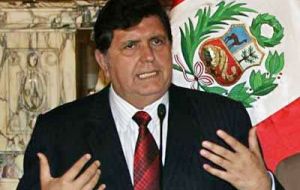MercoPress. South Atlantic News Agency
Fighting in the Peruvian Amazon turns ugly; death toll in the fifties
 President García’s push to develop resources turning into a political storm
President García’s push to develop resources turning into a political storm Nine Peruvian police officers were killed Saturday after security forces regained control of a petroleum facility in a remote jungle region from indigenous groups that are protesting against logging and oil exploration rights awarded by the government.
The new deaths brought to 22 the number of police officers killed, seven with spears, since security forces moved early Friday to break up a roadblock manned by 5.000 protesters. Seven other officers are missing.
Protest leaders said at least 30 Indians, including three children, died in the clashes. Authorities said they could confirm only nine civilian deaths, but cabinet chief Yehude Simon told reporters that 155 people had been injured, about a third of them with bullet wounds. He also announced a 3 p.m.-6 a.m. curfew in the affected region and said authorities had made 72 arrests.
“The government was required to take these measures, not only for the president of the republic but for all 28 million Peruvians,” Simon said of breaking up the protests, which blocked the flow of oil and gas out of the Amazon and prevented food and supplies from coming in. “We've all been affected one way or another by the protest ... when they take over highways and strategic points that can affect the national economy.”
The political violence is Peru is the worst since the Shining Path insurgency was quelled more than a decade ago and anticipates tough times ahead for President Alan Garcia and his ambitious plans to boost Peru's oil and gas output.
The political ingredient for Friday’s incident triggering came when lawmakers blocked an effort Thursday to allow debate on one of Mr. García’s most polemical decrees, which would open as much as 60% of Peru’s jungles to oil exploration and other extractive investments.
In the Amazonas province violence erupted when security forces moved to break up a roadblock protesters mounted in early April. About 1,000 protesters seized police during the melee, taking more than three dozen hostages, officials said.
Twenty-two officers were rescued in Saturday's storming of Station No. 6 at government owned oil company Petroperu in Imacita, in Amazonas, Defense Minister Antero Florez told the Radioprogramas radio network. He said seven officers were missing.
Simon said the nine killed were taken more than a mile from the station and slain while an army general was negotiating protesters' retreat from the facility.
Also on Saturday, a judge ordered the arrest of protest group leader Alberto Pizango on sedition charges for allegedly inciting the violence, said the president of Peru's Supreme Court, Javier Villa Stein.
Interior Minister Mercedes Cabanillos said Pizango had fled, likely to neighbouring Bolivia where the government is dominated by the country's indigenous majority. Pizango is a senior member of the Peruvian Jungle Interethnic Development Association,
On Friday, Pizango accused the government of “genocide” for attacking what he called a peaceful protest. Indians have been blocking roads, waterways and a state oil pipeline intermittently since April 9, demanding that Peru's government repeal the laws they say help foreign companies exploit their lands.
Indigenous leaders and environmental groups allege the laws open communal jungle lands and water resources to oil drilling, logging, mining and large-scale farming. In addition President García is “violating international law” by failing to obtain their consent for the projects.
According to the Peruvian constitution the government owns all subsoil rights across the country and Garcia has vigorously sought to exploit its mineral resources arguing they are necessary to help develop the country.
Indigenous groups claim Garcia's government does not consult them in good faith before signing contracts that could affect at least 30,000 Amazon Indians across six provinces. Last month, Roman Catholic bishops in the region issued a statement calling the complaints legitimate.




Top Comments
Disclaimer & comment rules-

Read all commentsThis Venezuelan-orchestrated strife will continue until such time as Chavez's dog Humala becomes President. Then the Peruvian people will become servants of the Venezuelan dictator, like the Bolivians and Ecuadoreans.
Jun 08th, 2009 - 12:51 am 0Commenting for this story is now closed.
If you have a Facebook account, become a fan and comment on our Facebook Page!